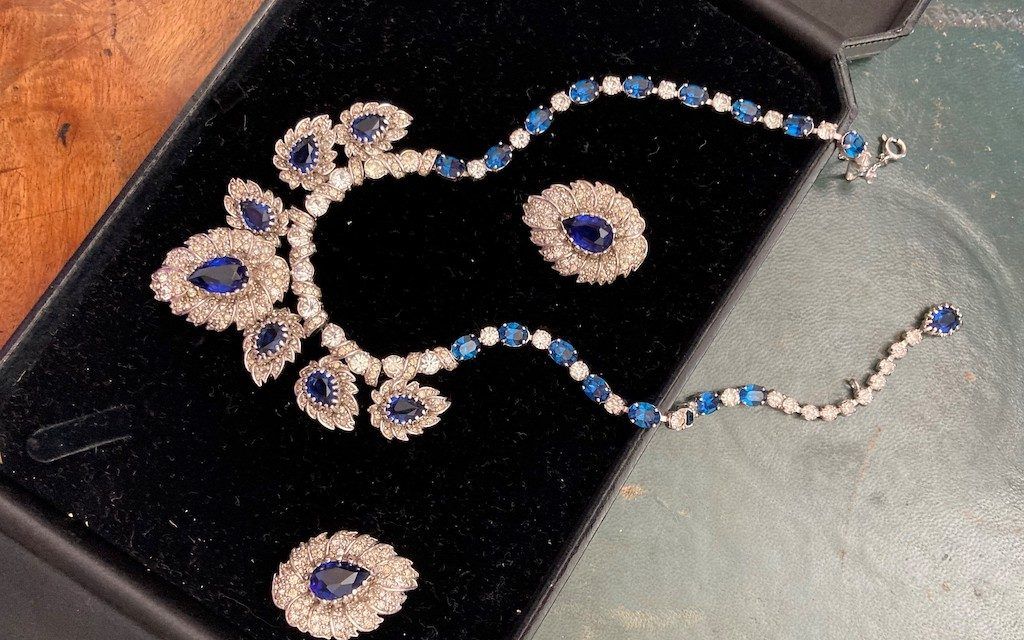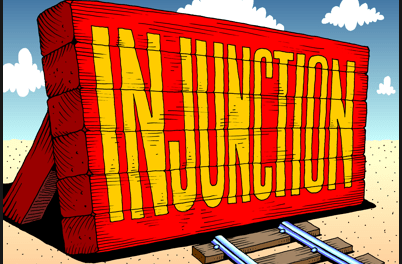‘Members of the jury have you reached a verdict upon which you are all agreed?’
‘We have.’
‘Do you find Christina Jade Thompson guilty or not guilty of stealing jewellery to a value of £150,000, the property of Ingrid Osborne -Strauss?’
I knew it would be an uphill battle. With mother suffering from early dementia, how could she go to court as a witness at the trial of her dedicated carer?
It had all started so promisingly.
I’d looked through Yellow Pages.
‘Hands On Helpers’ here? – how can we help?’
‘I’m looking for live-in help to care for my 93-year-old mother who has become very forgetful and rather confused lately.’
‘I’m sure we can help. We have a team of trained carers who have just the sort of experience you need. They have impeccable credentials. Now what are your name and contact details?’….
When Tina Thompson turned up at mother’s flat, I was there to meet her and to introduce her to mother. She was rather younger than I’d envisaged a dementia carer would be.
She was clearly impressed with the flat. To be fair, it is in one of the better areas of North London and mother has never had to go without. She had come over from Germany in 1938 as many Jews did on the Kindertrain, with just a small suitcase with a family name on the label. She never saw her parents again. We know the Gestapo had them on a list. Over here she somehow made contact with Uncle Hans, her father’s brother, a jeweller who had been in London for three or four years.
When he died my mother inherited the jewellery that had long been in the family. She was very proud that it had evaded the Nazi looters. Uncle Hans had managed to bring it out of Germany when he had come over here. It was a link to her parents and their past.
Tina and mother instantly seemed to like each other. At least mother took to her. And Tina seemed so interested in mother; perhaps not bright, but a good listener.
As I later told the police, I’ve no doubt over the weeks and months that followed that mother talked to Tina of the family’s ‘crown jewels’ as we called them. They were kept in the wall safe in the hall behind the picture of Uncle Hans. There were some impressive pieces, 19th Century necklaces with sapphires, brooches with large emeralds and some diamond rings.

I’d told mother they should be in the bank. She no longer went out after my father died. There were no more receptions or Livery Company dinners at which to wear them. But she wanted them with her ‘to keep her company‘, as she put it.
Tina was an attractive girl – and a willing one. It wasn’t all one-sided on my part. Anyway, my wife was too busy with her endless bridge parties to spend much time with me. I’d always used to visit mother regularly, but increasingly now that Tina was there.
I don’t know how the affair began. I suppose we were both lonely and bored. When mother was asleep in her room in the afternoon I decided to check out Tina’s ‘credentials’. We went to Tina’s room and one thing just led to another. She was certainly ‘hands on’.
She told me about the stories mother had told her about the jewels being smuggled out of Germany. I showed her the safe. Then over the weeks I began to give her some smaller pieces – to keep her quiet after she’d foolishly threatened to reveal to my wife and even mother what was going on. That was not playing the game. She needed to be taught the lesson: I was not someone to be messed with.
The whole thing came to a head when mother wanted to see a particular ring. We made excuses. Perhaps she’d mislaid it, lent it to someone… But she realised that something was not right. Then one day I arrived, and a CID officer was there, having tea with her. Tina was there too. She was suggesting that I must have moved them for safekeeping.
It was when the police arrived on my doorstep and told my wife about their inquiries that I told them that I’d unwisely given Tina the safe combination number as my mother could not remember it; that she liked now and then to see and handle the pieces of jewellery and show them to Tina.
I knew mother would not get to court, let alone give evidence. I was safe.
I don’t remember when I first started going to the casinos. It was initially just a way to pass the evening in pleasant company. They were always pleased to see me. I played the part of a ‘well-heeled toff’ rather well I thought. And the winnings were useful. I suppose that’s how they get you hooked. I kept going back to recoup my losses: my luck was bound to change. Or so I thought.
I couldn’t take any money out of the family business. My wife would find out. The cost of a divorce was not even an option. The children would blame me for spoiling their comfortable lives. They’d always had it all on a plate.
So it was that over the months I gradually helped myself to small bits and pieces of mother’s ‘crown jewels’: then to larger bits and pieces. She would never have given them to me. She had said she was leaving them to my daughters. ‘We are but stewards to pass them on to future generations’ she used to say. Generations which I reflected would never want to wear the heavy ostentatious, old fashioned necklaces and the rest.
But even the smaller pieces raised a good return at the very discreet West End pawnbrokers. They hadn’t even raised an eyebrow when I’d persuaded Tina to take items in – and sometimes to redeem them if I’d had a win at the tables.
Tina was a nice girl: trusting, naïve – and expendable. Desperate to keep her job and a roof over her head. It was going to come to light that things had gone missing when she was staying at the flat. There was only one solution. It was one which would save Tina her job. It would save my marriage, for my wife would never discover that I was a thief. It would save mother from the ordeal of having to go to court as a witness, and the painful realisation that her only son had taken cruel advantage of her. After all, I was her blue-eyed boy. She wouldn’t survive the shock that the boy she adored, had sent to a top public school and introduced into the family business had brought ‘shame’ upon the family name. The solution? Simple. It was for Tina to admit that she had temporarily ‘borrowed’ the pieces to raise cash, always intending to retrieve them. That wasn’t theft. She had the pawn tickets which the police found in her handbag, and they were able to confirm that a woman of Tina’s description had brought select pieces to the rather smart pawnbrokers over a period of time. How to get Tina to agree to take the rap? I persuaded her that she had too much at stake to refuse. Surprisingly Tina agreed! And she warmed to the idea of my giving her some generous extra ‘pocket money’ to compensate for looking after the needs of a rather trying old lady.
And then if Tina were to go to see a psychiatrist friend of mine and explain that she had a gambling addiction, that ‘addiction’ could be treated by my friend and she would soon become a model citizen again: she was to be pitied not condemned. Even if she ever saw the inside of a court, no jury would convict her of theft, since she had never intended ‘permanently to deprive the owner thereof’ as the statute book read, let alone a Judge to have to sentence her. And she believed me.
So, back to Court.
The old Judge seemed to have formed a view, judging by the helpful way he put things in his summing up.
‘Members of the jury, could it be that ensconced in the comfortable home of this vulnerable old lady, the accused decided to take advantage of her helplessness and forgetfulness?’
The jury retired. The Judge told them they were under no pressure of time. But from my point of view the sooner they returned with their decision the better. Whilst the jury were out, Tina was allowed to stay ‘within the precincts of the court’. I took her to the canteen. She seemed surprisingly calm. Then we were summoned back to court: I made my way to the public gallery, Tina to the dock.
The foreman of the jury cleared his throat – ‘We find her Guilty’.
‘Is that the verdict of you all?’
‘It is’.
I saw Tina shake her head in disbelief.
But I thought ‘what a relief – she was the convicted thief: I was off the hook’. Now we needed to ensure that the ‘convict Tina’ was still going to be available for our enjoyable afternoon sessions at mother’s and not languishing in a prison cell.
Tina’s counsel was on her feet.
‘Your Honour, I apply for an adjournment to obtain a psychiatric report.’
‘What help will that be?’
‘She is of good character and was under a lot of pressure at the time of the theft. I hope it may provide a basis for Your Honour to consider suspending the inevitable prison sentence so that she does not have to go inside but can start rebuilding her life.’
‘Very well. I will extend bail to her. The case will be listed in 6 weeks’ time. I make no promises as to the eventual outcome of the case.’
‘I am grateful’.
And so was I. It looked promising. Tina wasn’t so sure. But I managed to reassure her that that was what Judges always said.
I took Tina to see my psychiatrist friend. I even paid handsomely for the report he produced. It was the least I could do.
And so, we are now back at court six weeks later for the sentencing. Counsel is on her feet.
‘The report confirms what my client has now told me of her deep gambling addiction. At first, she would borrow one or two items of jewellery to wear when she went to the casino. It gave her confidence and made her more acceptable. Then, when things went wrong, and the gambling really took hold she thought she could pawn one or two pieces and redeem them when her luck changed. Of course, it never did. But that is what an addiction is: it is an illness. You are unable to think rationally or behave sensibly.
She should have gone to her employer – or her son – and explained the mess. But she couldn’t face it. Things looked so bleak. She would lose her job and her home there, and she would never get another position. Now she can receive help over a period of months to break this terrible habit and return to society a wiser and more chastened individual.’
The Judge did not look over impressed with the idea of Tina returning to mother’s and – unbeknown to him – to such loving consolations as I could offer her.
‘Stand up please, Christina Jade Thompson. Your counsel rightly acknowledges that only a prison sentence can mark the seriousness of your stealing. She points to your good character and explains your gambling addiction as the reason for this descent into crime. But crime it was. And serious crime. It involved a breach of trust. A vulnerable victim. It continued over many months. It involved jewellery of substantial value. Of great sentimental value too. Only some few items have been recovered. Money will not compensate Mrs Osborne-Strauss. Her condition is such that she misses you, wants to know why you suddenly had to leave her. She feels guilty that she did something that got you into trouble. When she could not find some items, she even blamed her own son for taking them without her knowledge. It has caused a rift in the family which may never go away. Only a prison sentence is appropriate. The question of suspending such sentence I cannot entertain. You will go to prison for two years.’
Tina was in tears as she was led away. Too late she’d realised that she shouldn’t have agreed to do as I suggested. She should have told the truth. Too late for that now.
But the Judge had not concluded his remarks. He turned to me.
‘Mr Osborne-Strauss, your family has been through a dreadful ordeal, and your kindness was cruelly repaid with a callous breach of trust. I hope you will all recover.’
‘Thank you, Your Honour. I’m sure with time we shall get over it’.
In fact, we have. The family has been very supportive, not blaming me for contacting ‘Hands On Helpers’ and bringing a thief into mother’s home. They were happy for me to ‘sort out’ the whole distasteful episode. Following the conviction, the Insurance Company has agreed to pay out every penny lost. And at the rather satisfactory valuations I submitted.
But as the Judge said ‘money won’t compensate for the sentimental loss’– sure!
I rather think a return visit to the card tables at the casino is in order. Who knows – this time I may get some even better ‘hands’!

Master Paul Worsley is a former Judge and Barrister. He both prosecuted and defended criminal cases, including the successful prosecution of Wearside Jack, who had pretended to be the Yorkshire Ripper. He later went on to sit as a Judge and heard cases at the Old Bailey.




